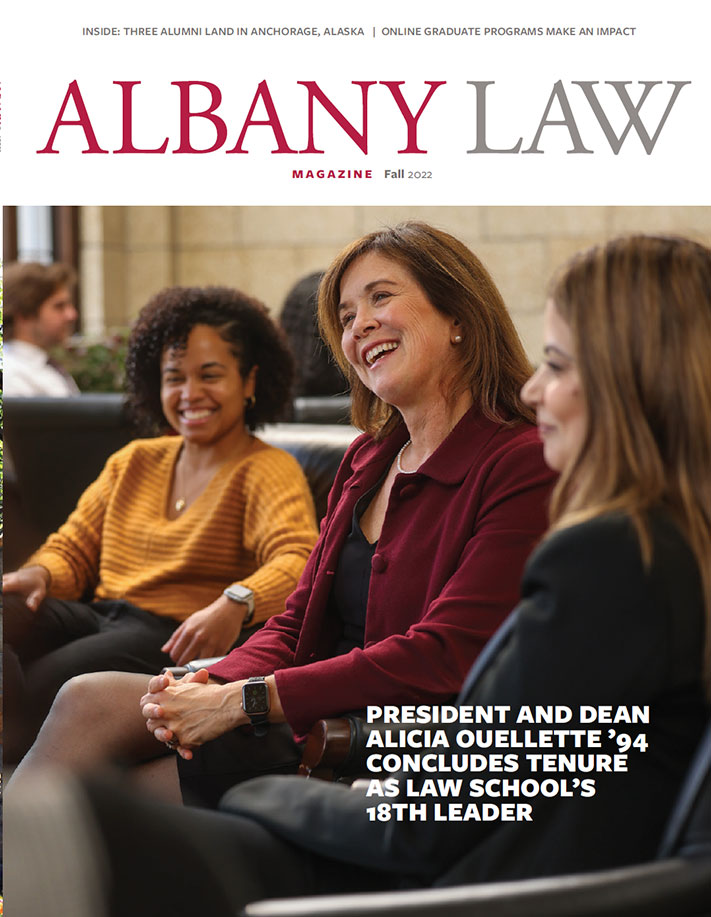ALBANYLAW Magazine | Fall 2022
Fighting the Opioid Crisis
Michael Quinn '11
Michael Quinn ’11 is fighting the devastating national opioid crisis pro bono. Quinn is a partner at the New York City law firm of Eisenberg & Baum, LLP, where he runs the Arts & Culture practice. He has spent much of his professional life providing legal advice to artists and creative companies. His work includes negotiating with collectors and dealers, advising on gallery representation and estate planning, drafting intellectual property contracts, and much more.
This “much more” includes fighting both inside and outside of the courtroom against the opioid manufacturer Purdue Pharma, and its owners, the Sackler family. Starting in the late 1990s, pharmaceutical manufacturers— including Purdue— the maker of OxyContin— began illicitly marketing prescription opioids as non- addictive. These companies, along with distributors and drug providers, flooded the country with dangerous drugs. As a result, hundreds of thousands of people became dependent on opioids. According to the Center for Disease Control, more than 932,000 people have died since the 90s from prescription and illicit opioids. Countless more individuals and families continue to be ravaged by substance use disorder.
Quinn represents the renowned artist Nan Goldin, who spearheaded the campaign against the Sackler family.

Having struggled herself with Oxy-Contin dependency, in late 2017, Goldin recognized that the Sackler name was commonplace among the top patrons of art and cultural institutions—including the very institutions that showcase her work: The Metropolitan Museum of Art, the Guggenheim, and the Louvre. With Quinn’s help, Goldin and other artists and advocates formed a grassroots group called P.A.I.N. (Prescription Addiction Intervention Now) which held notable demonstrations at museums to bring public awareness to the Sacklers’ role in the opioid crisis.
By 2019, as Purdue and the Sacklers faced mounting legal pressure from victims and States Attorneys General, Purdue Pharma declared bankruptcy as a way to escape, or at least cap the family’s liability. Using a novel legal mechanism, Quinn gave Goldin and other activists a voice in the case. He formed a creditor’s committee within the case that was more interested in holding the Sacklers
accountable than in the limited financial recovery being offered. The group called itself the Committee on Accountability.
Michael Quinn’s creative behind-the-scenes efforts in Congress to hold the Sackler Family accountable are featured in a new book and a documentary.
He also received The Lotos Award of Distinction on October 3, 2022.
The Lotos Club is one of the oldest literary clubs in the United States.
Quinn’s work, including his “fiery pleadings” and creative behind-the-scenes efforts in Congress to hold the Sackler’s accountable, are chronicled by the best- selling author of “Dopesick,” Beth Macy, in her new book “Raising Lazarus: Hope, Justice, and the Future of America’s Overdose Crisis.” He is also featured in a new documentary “All the Beauty and the Bloodshed,” by Oscar winning director Laura Poitras, which premiered in early September at the Venice film festival.
While Quinn was an Albany Law student, he worked as a law clerk in the U.S. Attorney’s Office for the Northern District of New York.
“It was great training on a number of fronts, for research and writing, but also for learning how to be a dogged fighter in a case through review of evidence and applying the evidence to the law and go after the bad guys,” he said.
Contracts with Professor Alex Seita was another standout, Quinn said.
“That class was extremely important, right from the beginning,” he said. “I really had a fundamental understanding of what agreements were and how agreements applied in my practice to what’s actually going on in the real world.”
The experience and training he received at Albany Law School helped set the groundwork for his passion to make a difference in the lives of people and places that matter to him.
“There is a real opportunity to take what you learned at law school and apply it to issues that have major importance both to you personally, but also to people in your community,” he said. “In my case, I work with artists and people in the cultural space and that’s my community, but I’ve been able to take their concerns and use what I’ve learned at Albany Law School and what I’ve learned as a lawyer to really try to make a difference for both their community and in the world at large.”

